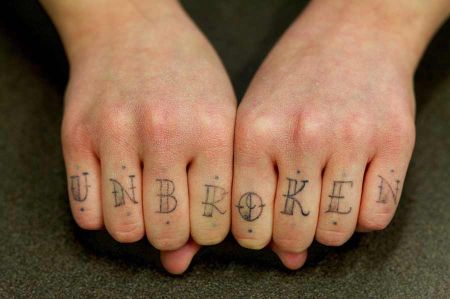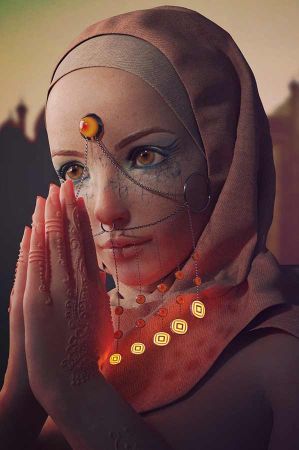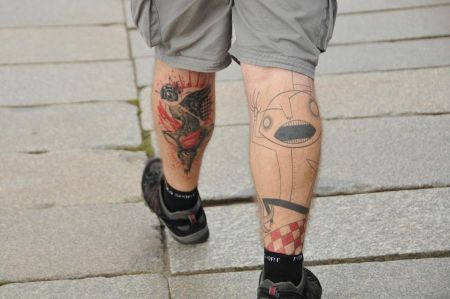Turkish government bans students from piercings and tattoos
- Written by Portal Editor
The Islamic, conservative government in Turkey is launching new rules in an attempt to encourage the country's students to be more disciplined.
That is why the ruling AKP party has, among other things, banned the wearing of tattoos and piercings in schools, and students are also not allowed to appear in class with dyed hair. An infringement on the personal rights of each individual?
Is wearing the headscarf not a political, religious symbol?
 “Students must show their faces at all times in schools, are not allowed to wear scarves, hats or bags with political symbols, are not allowed to dye their hair, are not allowed to wear tattoos or make-up, are not allowed to wear piercings, are not allowed to have a beard,” it says it, among other things, in the new rules published in Ankara. At the same time, the government confirmed that girls will be allowed to wear the headscarf during class once they enter the fifth grade. An unusual order banning the wearing of scarves and hats that display political or religious statements or symbols. Is wearing the headscarf not a political religious symbol?
“Students must show their faces at all times in schools, are not allowed to wear scarves, hats or bags with political symbols, are not allowed to dye their hair, are not allowed to wear tattoos or make-up, are not allowed to wear piercings, are not allowed to have a beard,” it says it, among other things, in the new rules published in Ankara. At the same time, the government confirmed that girls will be allowed to wear the headscarf during class once they enter the fifth grade. An unusual order banning the wearing of scarves and hats that display political or religious statements or symbols. Is wearing the headscarf not a political religious symbol?
Quite apart from the questions about the implementation and control of such interventions in personal rights - who decides what a symbol with political significance is?
 The chairman of the teachers' union Egitim Is, Veli Demir, criticized the regulations because they are neither controllable nor implementable, an initially cautious formulation. "What should happen to the students who already have a tattoo? Will they tear their skin off? This decision cannot have been made by a sensible person," Demir then told the newspaper "Radikal". Violations should lead to censure, temporary exclusion from classes or expulsion from school.
The chairman of the teachers' union Egitim Is, Veli Demir, criticized the regulations because they are neither controllable nor implementable, an initially cautious formulation. "What should happen to the students who already have a tattoo? Will they tear their skin off? This decision cannot have been made by a sensible person," Demir then told the newspaper "Radikal". Violations should lead to censure, temporary exclusion from classes or expulsion from school.
Ismail Koncuk, head of the teachers' union Egitim Sen, said, however, that it was not necessary for existing tattoos to be removed. The ban only applies to future tattoos: "There will be confusion about when the tattoo was done. But I think on this issue the school will take the initiative and help the child." Which would probably be the least. It is only surprising that there has not yet been a further social outcry against the background of the infringement on the personal rights of every individual. But the problems in Turkey are currently different.
 Where these new regulations come from is no big secret, as the current President has never made a secret of his attitude towards body jewellery.
Where these new regulations come from is no big secret, as the current President has never made a secret of his attitude towards body jewellery.
The following statement to the young footballer Berk Yildiz is still too good: "What are these tattoos for? Why are you harming your body? Don't let foreigners seduce you. You could even get skin cancer from them."
Whether and how much truth there may be in this statement, whether the president is concerned about the well-being of the player, is fundamentally completely irrelevant: it is solely Berk Yildiz's business!
New dress code in Turkish schools: headscarves allowed; tattoos banned
 As would be expected, such advances immediately bring with them further demands. According to the English-language online newspaper “Hürriyet Daily News”, the Egitim-Bir-Sen education union is demanding the reintroduction of gender segregation in lessons and freedom from school dress codes following the government decree.
As would be expected, such advances immediately bring with them further demands. According to the English-language online newspaper “Hürriyet Daily News”, the Egitim-Bir-Sen education union is demanding the reintroduction of gender segregation in lessons and freedom from school dress codes following the government decree.
The opposition Cumhuriyet Halk Partisi (CHP) is vigorously protesting against the government's new school law, which sets a mandatory dress code for all schools in the country, CHP chairman Kılıçdaroğlu told Hürriyet:
“The AKP’s ‘New Turkey’ not only goes against an 81-year-old tradition of the republic, but also betrays the thousand-year history of Anatolian Islam and our tradition of Sufism. We have to say that this mentality is not a local one.”
 According to Kılıçdaroğlu, the AKP adheres to an “exported religion” that has connections to enemies of humanity such as IS. It is unbearable that “those who turned Turkey into a country of bans and human rights violations are now presenting nine-year-old girls with veils as a question of freedom. A mentality that has a problem with the clothing of TV presenters cannot talk about freedom in the area of dress codes.
According to Kılıçdaroğlu, the AKP adheres to an “exported religion” that has connections to enemies of humanity such as IS. It is unbearable that “those who turned Turkey into a country of bans and human rights violations are now presenting nine-year-old girls with veils as a question of freedom. A mentality that has a problem with the clothing of TV presenters cannot talk about freedom in the area of dress codes.
The teachers' union now wants to appeal to the State Council, the European Court of Human Rights (ECHR) and the UN Commission on Children's Rights because the new dress code violates the constitution. However, the government has already made it clear that the new regulation does not apply retroactively and therefore tattoos that have already been applied do not have to be removed.
The personal right
 The general right to personality (APR) is an absolute, comprehensive right to respect and development of the personality. It was already recognized by the Reich Court and was noted, for example, in a decision to publish letters from Richard Wagner RGZ 41, 43, 49. It was recognized by the Federal Court of Justice in 1954 on Article 2 Paragraph 1 of the Basic Law (Free Development of Personality) in conjunction with Article 1 Paragraph 1 GG (Protection of Human Dignity). The Federal Constitutional Court highlighted the importance of the APR in its Lebach ruling of 1973. The Federal Constitutional Court sees it as the task of general personal rights,
The general right to personality (APR) is an absolute, comprehensive right to respect and development of the personality. It was already recognized by the Reich Court and was noted, for example, in a decision to publish letters from Richard Wagner RGZ 41, 43, 49. It was recognized by the Federal Court of Justice in 1954 on Article 2 Paragraph 1 of the Basic Law (Free Development of Personality) in conjunction with Article 1 Paragraph 1 GG (Protection of Human Dignity). The Federal Constitutional Court highlighted the importance of the APR in its Lebach ruling of 1973. The Federal Constitutional Court sees it as the task of general personal rights,
“in the spirit of the highest constitutional principle of “human dignity” (Art. 1 Para. 1 GG) to ensure the narrower personal sphere of life and the preservation of its basic conditions, which cannot be fully covered by the traditional concrete guarantees of freedom; This necessity exists particularly in view of modern developments and the new threats to the protection of human personality associated with them.”
Please read as well:
